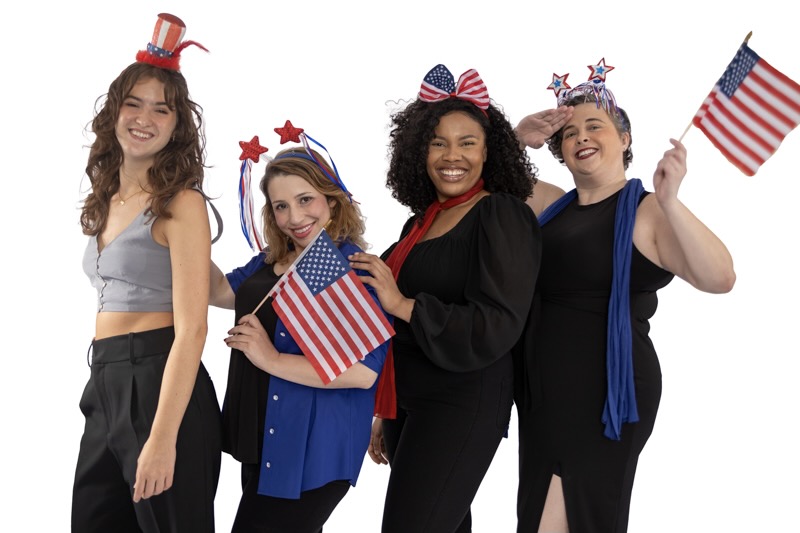
4 out of 5 cast members looking patriotic. Photo by Andrew Keefe.
Presented by Hub Theatre Company of Boston
Written by Genevra Gallo-Bayiates, Chloe Johnston, Andy Bayiates, Bilal Dardai, and Sharon Greene
Direction and Choreography: Ilyse Robbins
Music Direction by Jack Cline
Puppet Design by E. Rosser and Samantha Mastrati
Produced by Lauren Elias
Lighting Design by Emily Bearce
Scenic Desig by Justin Lahue
Costume Design by E. Rosser
Featuring Yasmeen Duncan, Lauren Elias, Eleni Kontzamanys, Sophia Muharram, Katie Pickett
July 20 – August 3, 2024
Club Cafe
209 Columbus Ave. Back Bay
Boston, MA 02116
Article by Craig Idlebrook
BOSTON — When is history actually in the rear-view mirror?
That was the question that intentionally and unintentionally arose on a Sunday matinee showing of 46 Plays for America’s First Ladies, being performed by Hub Theatre Company of Boston. When the play began, it offered a complete telling of the lives of the women most closely connected to U.S. presidents through marriage, bloodlines, or involuntary servitude, or some combination of the three. When the play ended, it felt glaringly incomplete, as news had broken that the current occupant of the Oval Office had ended his reelection campaign and endorsed Vice President Kamala Harris to be the new Democratic nominee.
That Vice President Harris suddenly finds herself in a fraught political moment thanks to the action of a man in power would fit seamlessly into the narrative of this important play, which is bravely and entertainingly staged by Hub’s strong cast. 46 Plays insightfully illuminates the inherent contradiction of the made-up-but-very-political role of “First Lady”. It is an undemocratic role that often comes with high expectations and hefty judgements for women who, by and large, didn’t sign up for it, and in some cases weren’t even aware that it was a possibility. While each woman’s situation in the Oval Office is unique, each must wrestle with feelings of powerlessness in proximity to power.
This play manages to deliver impactful and often disconcerting truths about women in American history in a cabaret-like format, intermixing song-and-dance numbers with beats of quiet desolation. The Hub Theatre production largely makes the script’s necessary hairpin turns from humor to darkness and back again, resulting in a nonstop, entertaining ride through some 235 years of history.
While each member of the ensemble shines and brings their own toolkit of skills to this production, Lauren Elias stood out to me for most easily inhabiting the role of an MC. Elias discusses complex historical beats as if she were an old friend discussing family lore. Universally, there is no let-up in the energy level of the cast, which proves invaluable to help the audience glide through the few errant moments when the script or production crosses over from storytelling to lecturing. For the most part, however, the script and cast wisely let the bizarre and heartbreaking beats of history speak for themselves, with little to no commentary or flourish. This allows the audience to sit with the profound contradictions, violence, and hope of which this country’s history is composed.
This pay-what-you-can production is hosted at Club Cafe, a queer-friendly bar, dance hall, and cabaret. While the largely joyful murmur of the bar sometimes seeps through the walls, the cabaret itself offers an intimate venue for witnessing this high-energy spectacle, allowing the audience to feel more like co-conspirators than passive receptacles for knowledge. Technical glitches at times complicated the production, but never derailed it, and the lighting, though complex, never upstaged the simple human action on stage.
This play offers more questions than answers and gives us a chance to see how each woman wrestled with their power and their limitations in this important, undemocratic role of our democracy. When the production ended and we learned the news of Harris’ candidacy for the presidency, we were given a new question to answer about the character of our country. The answer may be clear to subsequent generations, or, as so often is the case with many of the women lost to American history, it may never become clear at all.
